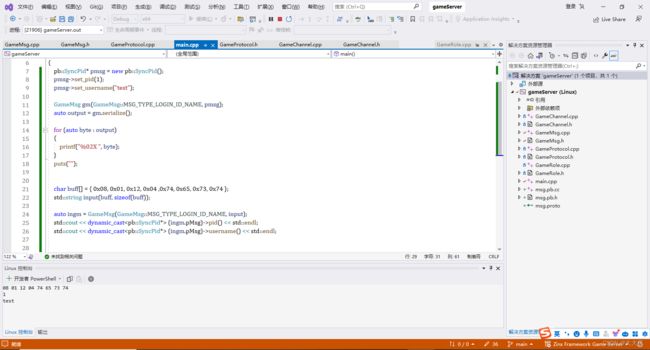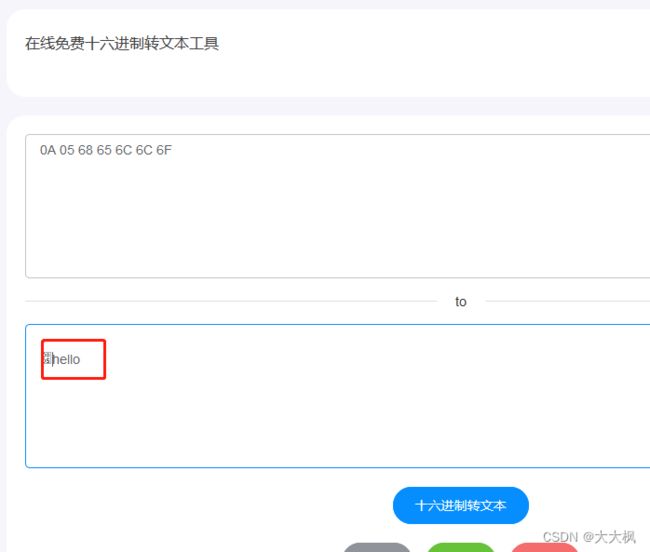Zinx框架-游戏服务器开发003:架构搭建-需求分析及TCP通信方式的实现
文章目录
- 1 项目总体架构
- 2 项目需求
-
- 2.1 服务器职责
- 2.2 消息的格式和定义
- 3 基于Tcp连接的通信方式
-
- 3.1 通道层实现GameChannel类
-
- 3.1.1 TcpChannel类
- 3.1.2 Tcp工厂类
- 3.1.3 创建主函数,添加Tcp的监听套接字
- 3.1.4 代码测试
- 3.2 消息类的结构设计和实现
-
- 3.2.1 消息的定义
- 3.2.2 消息类-用户请求对象的创建
- 3.2.3 protoc消息的创建
- 3.2.4 消息对象的构造与解析
- 3.2.5 代码测试-1
- 3.2.6 报文里的多条请求
- 3.2.7 Tcp报文粘包的处理
- 3.2.8 数据包测试
-
- 3.2.8.1 完整数据
- 3.2.8.2 数据缺失和错误
- 3.2.9 协议和通道相互绑定
-
- 3.2.9.1 循环引用的问题
- 3.2.9.1 相互绑定的实现
- 3.2.9.3 代码测试
1 项目总体架构
2 项目需求
2.1 服务器职责
服务器职责(接收客户端数据,发送数据给客户端)
- 新客户端连接后,向其发送ID和名称
- 新客户端连接后,向其发送周围玩家的位置
- 新客户端连接后,向周围玩家发送其位置
- 收到客户端的移动信息后,向周围玩家发送其新位置
- 收到客户端的移动信息后,向其发送周围新玩家位置
- 收到客户端的聊天信息后,向所有玩家发送聊天内容
- 客户端断开时,向周围玩家发送其断开的消息
2.2 消息的格式和定义
- 消息定义
每一条服务器和客户端之前的消息都应该满足以下格式
消息内容的长度(4个字节,低字节在前)| 消息ID(4个字节,低字节在前)| 消息内容 |
消息以及其处理方式已经在客户端实现,本项目要实现的是服务器端的相关处理
- 详细定义如下
| 消息ID | 消息内容 | 发送方向 | 客户端处理 | 服务器处理 |
|---|---|---|---|---|
| 1 | 玩家ID和玩家姓名 | S->C | 记录自己ID和姓名 | 无 |
| 2 | 聊天内容 | C->S | 无 | 广播给所有玩家 |
| 3 | 新位置 | C->S | 无 | 处理玩家位置更新后的信息同步 |
| 200 | 玩家ID,聊天内容/初始位置/动作(预留)/新位置 | S->C | 根据子类型不通而不同 | 无 |
| 201 | 玩家ID和玩家姓名 | S->C | 把该ID的玩家从画面中拿掉 | 无 |
| 202 | 周围玩家们的位置 | S->C | 在画面中显示周围的玩家 | 无 |
3 基于Tcp连接的通信方式
3.1 通道层实现GameChannel类
3.1.1 TcpChannel类
- 使用框架提供的Tcp通信类
- 创建GameChannel类继承ZinxTcpData,重写GetInputNextStage函数,将tcp收到的数据交给协议对象解析
每个协议对象只处理本通道的协议数据
GameProtocol* m_proto = NULL;
创建对象啊以后交给m_proto,通过该变量访问通道内的数据
AZinxHandler* GameChannel::GetInputNextStage(BytesMsg& _oInput)
{
return m_proto;
}
3.1.2 Tcp工厂类
- 创建GameChannelFac类用于创建基于连接的GameChannel对象
- 因为玩家是通过tcp连接,所以tcp通道,协议对象,和玩家对象是一对一对一的绑定关系
- 创建通道的时候,需要创建协议,并且绑定协议对象
ZinxTcpData* GameConnFact::CreateTcpDataChannel(int _fd)
{
/*创建tcp通道对象*/
auto pChannel = new GameChannel(_fd);
/*创建协议对象*/
auto pProtocol = new GameProtocol();
/*绑定协议对象*/
pChannel->m_proto = pProtocol;
/*将协议对象添加到kernel, 注意参数需要为指针*/
ZinxKernel::Zinx_Add_Proto(*pProtocol);
return pChannel;
}
3.1.3 创建主函数,添加Tcp的监听套接字
#include "GameChannel.h"
int main()
{
ZinxKernel::ZinxKernelInit();
/*添加监听通道:需要端口号和连接*/
ZinxKernel::Zinx_Add_Channel(*(new ZinxTCPListen(8899, new GameConnFact())));
ZinxKernel::Zinx_Run();
ZinxKernel::ZinxKernelFini();
}
3.1.4 代码测试
设置标准输入
UserData* GameProtocol::raw2request(std::string _szInput)
{
cout << _szInput << endl;
return nullptr;
}
3.2 消息类的结构设计和实现
3.2.1 消息的定义
//h
enum MSG_TYPE {
MSG_TYPE_LOGIN_ID_NAME = 1,
MSG_TYPE_CHAT_CONTENT = 2,
MSG_TYPE_NEW_POSTION = 3,
MSG_TYPE_BROADCAST = 200,
MSG_TYPE_LOGOFF_ID_NAME = 201,
MSG_TYPE_SRD_POSTION = 202
} enMsgType;
3.2.2 消息类-用户请求对象的创建
- 一个类一个请求
//h
class GameMsg :
public UserData
{
public:
/*用户的请求信息*/
google::protobuf::Message * pMsg = NULL;
enum MSG_TYPE {
MSG_TYPE_LOGIN_ID_NAME = 1,
MSG_TYPE_CHAT_CONTENT = 2,
MSG_TYPE_NEW_POSTION = 3,
MSG_TYPE_BROADCAST = 200,
MSG_TYPE_LOGOFF_ID_NAME = 201,
MSG_TYPE_SRD_POSTION = 202
} enMsgType;
/*已知消息内容创建消息对象*/
GameMsg(MSG_TYPE _type, google::protobuf::Message * _pMsg);
/*将字节流内容转换成消息结构*/
GameMsg(MSG_TYPE _type, std::string _stream);
/*序列化本消息*/
std::string serialize();
virtual ~GameMsg();
};
- 一个消息类里应该要放多条请求,每个请求一条消息
class MultiMsg :public UserData {
public:
std::list<GameMsg *> m_Msgs;
};
3.2.3 protoc消息的创建
protoc msg.proto --cpp_out=./
syntax="proto3";
package pb;
//无关选项,用于客户端
option csharp_namespace="Pb";
message SyncPid{
int32 Pid=1;
string Username=2;
}
message Player{
int32 Pid=1;
Position P=2;
string Username=3;
}
message SyncPlayers{
/*嵌套多个子消息类型Player的消息*/
repeated Player ps=1;
}
message Position{
float X=1;
float Y=2;
float Z=3;
float V=4;
int32 BloodValue=5;
}
message MovePackage{
Position P=1;
int32 ActionData=2;
}
message BroadCast{
int32 Pid=1;
int32 Tp=2;
/*根据Tp不同,Broadcast消息会包含:
聊天内容(Content)或初始位置(P)或新位置P*/
oneof Data{
string Content=3;
Position P=4;
/*ActionData暂时预留*/
int32 ActionData=5;
}
string Username=6;
}
message Talk{
string Content=1;
}
3.2.4 消息对象的构造与解析
GameMsg::GameMsg(MSG_TYPE _type, std::string _stream) :enMsgType(_type)
{
/*通过简单工厂构造具体的消息对象*/
switch (_type)
{
case GameMsg::MSG_TYPE_LOGIN_ID_NAME:
pMsg = new pb::SyncPid();
break;
case GameMsg::MSG_TYPE_CHAT_CONTENT:
pMsg = new pb::Talk();
break;
case GameMsg::MSG_TYPE_NEW_POSTION:
pMsg = new pb::Position();
break;
case GameMsg::MSG_TYPE_BROADCAST:
pMsg = new pb::BroadCast();
break;
case GameMsg::MSG_TYPE_LOGOFF_ID_NAME:
pMsg = new pb::SyncPid();
break;
case GameMsg::MSG_TYPE_SRD_POSTION:
pMsg = new pb::SyncPlayers();
break;
default:
break;
}
/*将参数解析成消息对象内容*/
pMsg->ParseFromString(_stream);
}
std::string GameMsg::serialize()
{
std::string ret;
pMsg->SerializeToString(&ret);
return ret;
}
3.2.5 代码测试-1
3.2.6 报文里的多条请求
//h
class MultiMsg :public UserData {
public:
std::list<GameMsg*> m_Msgs; //注意此处要加命名空间
};
MultiMsg* pRet = new MultiMsg(); //此时没有用户请求
/*构造一条用户请求*/
GameMsg* pMsg = new GameMsg((GameMsg::MSG_TYPE)id, szLast.substr(8, iLength)); // iLength是正文的长度
pRet->m_Msgs.push_back(pMsg);
//Debug打印每条请求
for (auto single : pRet->m_Msgs)
{
cout << single->pMsg->Utf8DebugString() << endl;
}
3.2.7 Tcp报文粘包的处理
添加数据头4+ID4+数据信息
UserData* GameProtocol::raw2request(std::string _szInput)
{
MultiMsg* pRet = new MultiMsg(); //此时没有用户请求
szLast.append(_szInput);
while (1)
{
if (szLast.size() < 8)
{
break;
}
/*在前四个字节中读取消息内容长度*/
int iLength = 0;
iLength |= szLast[0] << 0;
iLength |= szLast[1] << 8;
iLength |= szLast[2] << 16;
iLength |= szLast[3] << 24;
/*中四个字节读类型id*/
int id = 0;
id |= szLast[4] << 0;
id |= szLast[5] << 8;
id |= szLast[6] << 16;
id |= szLast[7] << 24;
/*通过读到的长度判断后续报文是否合法*/
if (szLast.size() - 8 < iLength)
{
/*本条报文还没够,啥都不干*/
break;
}
/*构造一条用户请求*/
GameMsg* pMsg = new GameMsg((GameMsg::MSG_TYPE)id, szLast.substr(8, iLength)); // iLength是正文的长度
pRet->m_Msgs.push_back(pMsg);
/*弹出已经处理成功的报文*/
szLast.erase(0, 8 + iLength);
}
//Debug打印每条请求
for (auto single : pRet->m_Msgs)
{
cout << single->pMsg->Utf8DebugString() << endl;
}
return pRet;
}
/*参数来自业务层,待发送的消息
返回值转换后的字节流*/
std::string * GameProtocol::response2raw(UserData & _oUserData)
{
int iLength = 0;
int id = 0;
std::string MsgContent;
GET_REF2DATA(GameMsg, oOutput, _oUserData);
id = oOutput.enMsgType;
MsgContent = oOutput.serialize();
iLength = MsgContent.size();
auto pret = new std::string();
pret->push_back((iLength >> 0) & 0xff);
pret->push_back((iLength >> 8) & 0xff);
pret->push_back((iLength >> 16) & 0xff);
pret->push_back((iLength >> 24) & 0xff);
pret->push_back((id >> 0) & 0xff);
pret->push_back((id >> 8) & 0xff);
pret->push_back((id >> 16) & 0xff);
pret->push_back((id >> 24) & 0xff);
pret->append(MsgContent);
return pret;
}
3.2.8 数据包测试
3.2.8.1 完整数据
08 00 00 00 01 00 00 00 08 01 12 04 74 65 73 74
08 00 00 00 - 前4个字节存储数据消息的长度,变量值是数据消息的长度为8个字节。
01 00 00 00 - 第5-8个字节存储的是用户的ID,变量值表示用户ID是1
08 01 12 04 74 65 73 74 - 末尾8个字节表示数据消息的全部内容

3.2.8.2 数据缺失和错误
收到数据以后,啥都不干
3.2.9 协议和通道相互绑定
3.2.9.1 循环引用的问题
在GameChannel.h中引用了头文件"GameProtocol.h"
#pragma once
#include如果在GameProtocol.h中引用GameChannel.h,则会造成循环引用。
处理办法是,直接在前面声明相关的类。
#pragma once
#include 3.2.9.1 相互绑定的实现
3.2.9.3 代码测试
收到数据
07 00 00 00 02 00 00 00 0A 05 68 65 6C 6C 6F
07 00 00 00 - 数据消息的长度是7个字节
02 00 00 00 - 消息ID是2
0A 05 68 65 6C 6C 6F - 转换成string代表"hello"








